De Portugese dichter en schrijver Fernando António Nogueira Pessoa werd geboren in Lissabon op 13 juni 1888. Zie ook alle tags voor Fernando Pessoa op dit blog
I don’t know if the stars rule the world
I don’t know if the stars rule the world
Or if Tarot or playing cards
Can reveal anything.
I don’t know if the rolling of dice
Can lead to any conclusion.
But I also don’t know
If anything is attained
By living the way most people do.
Yes, I don’t know
If I should believe in this daily rising sun
Whose authenticity no one can guarantee me,
Or if it would be better (because better or more convenient)
To believe in some other sun,
One that shines even at night,
Some profound incandescence of things,
Surpassing my understanding.
For now…
(Let’s take it slow)
For now
I have an absolutely secure grip on the stair-rail,
I secure it with my hand –
This rail that doesn’t belong to me
And that I lean on as I ascend…
Yes… I ascend…
I ascend to this:
I don’t know if the stars rule the world.
Magnificat
When will this inner night – the universe – end
And I – my soul – have my day?
When will I wake up from being awake?
I don’t know. The sun shines on high
And cannot be looked at.
The stars coldly blink
And cannot be counted.
The heart beats aloofly
And cannot be heard.
When will this drama without theater
– Or this theater without drama – end
So that I can go home?
Where? How? When?
O cat staring at me with eyes of life, Who lurks in your depths?
It’s Him! It’s him!
Like Joshua he’ll order the sun to stop, and I’ll wake up,
And it will be day.
Smile, my soul, in your slumber!
Smile, my soul: it will be day!
Countless lives inhabit us
Countless lives inhabit us.
I don’t know, when I think or feel,
Who it is that thinks or feels.
I am merely the place
Where things are thought or felt.
I have more than just one soul.
There are more I’s than I myself.
I exist, nevertheless,
Indifferent to them all.
I silence them: I speak.
The crossing urges of what
I feel or do not feel
Struggle in who I am, but I
Ignore them. They dictate nothing
To the I I know: I write.
Vertaald door Richard Zenith
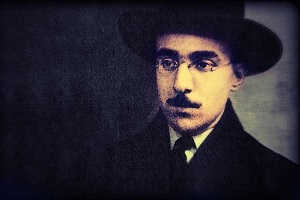
De Nederlandse schrijver Willem Brakman werd geboren op 13 juni 1922 in Den Haag. Zie ook alle tags voor Willem Brakman op dit blog.
Uit: De grote schok was Rilke
“Men ziet hoe een dergelijk, naar vele richtingen vertellend beeld het lineaire karakter van taal en verhaal kan doorbreken. Rilke, die niet alleen een zeer beeldend schrijver maar ook een beschikker over superbe beelden was, verdiende alleen al hierom een betere aansluiting met onze tijd. Maar het is stil om deze verstilde figuur. De vertaling van Nabokov’s Ada, zo’n tien jaar na verschijnen, deed in Duitsland honderd maal meer stof opwaaien dan de honderdste geboortedag van Rilke, in 1975. Het is druk in de letteren, te druk. Zeker voor een man ‘langsamen und abgewandten Geistes’. Voor mij was Rilke een geschenk van de oorlog, van honger, kou, duisternis en vooral van veel tijd. Prima Malte- elementen en ook hier bloeide de poëzie niet bepaald op een gezonde en sprankelfrisse bodem. Toch leefde ik met die poëzie op een intense, maar ook wel natuurlijke manier, want ik beschikte erdoor over bezwerende formules op momenten van grote zwakte. Brak ik op weg naar een vriend mijn nek door de duisternis ergens in een tuin, dan lag ik op mijn gezicht in ‘die Gärten des dunkelblaus’. Zeulde ik met mijn vader in de eindeloze hongerwinter de loodzware emmers as en sintels tegen de huthoge berg afval op voor ons huis, dan mompelde ik krachtgevend over ‘die Berge des Urleids’. Natuurlijk was dit een poging een uitgesproken rotwereld in zuivere versregels te transponeren en de vraag blijft knellen hoezeer een uitgesproken rotwereld voorwaarde is voor zuivere versregels.
Dat was in de oorlog. Na de oorlog werd dat anders. Zo werd Rilke een junge-Mädchendichter, een altes Weib. Thomas Mann, een andere ook door mij hoog in het vaandel gevoerde figuur, werd bij monde van Günter Grass ‘überkommener Existenz, verälteter Blödsinn’. Zelfs John Cowper Powys, een episch gigant der Engelse letteren en een sierraad in mijn boekenkast, mocht ik kortelings in ’n kritiek aantreffen als ‘an old windbag’. Een pijnlijke golfslag van de tijd en dubbel pijnlijk bij Rilke, want hem bewoog nu juist in hoge mate wat men zou kunnen noemen ‘der Wille zur Dauer’, een streven naar levensverduurzaming. Dit thema treedt op in tal van zijn gedichten en toont zich nadrukkelijk in veel situaties en personages van zijn Malte, ondermeer in Malte’s grootvader, die geen verschil maakt in de omgang met overleden familieleden, historische figuren en levende tijdgenoten.”
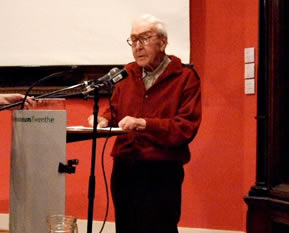
De Ierse dichter, toneelschrijver en mysticus William Butler Yeats werd geboren in Sandymount bij Dublin op 13 juni 1865. Zie ook alle tags voor William Butler Yeats op dit blog.
The Three Monuments
They hold their public meetings where
Our most renowned patriots stand,
One among the birds of the air,
A stumpier on either hand;
And all the popular statesmen say
That purity built up the State
And after kept it from decay;
And let all base ambition be,
For intellect would make us proud
And pride bring in impurity:
The three old rascals laugh aloud.
To A Shade
IF you have revisited the town, thin Shade,
Whether to look upon your monument
(I wonder if the builder has been paid)
Or happier-thoughted when the day is spent
To drink of that salt breath out of the sea
When grey gulls flit about instead of men,
And the gaunt houses put on majesty:
Let these content you and be gone again;
For they are at their old tricks yet.
A man
Of your own passionate serving kind who had brought
In his full hands what, had they only known,
Had given their children’s children loftier thought,
Sweeter emotion, working in their veins
Like gentle blood, has been driven from the place,
And instilt heaped upon him for his pains,
And for his open-handedness, disgrace;
Your enemy, an old fotil mouth, had set
The pack upon him.
Go, unquiet wanderer,
And gather the Glasnevin coverlet
About your head till the dust stops your ear,
The time for you to taste of that Salt breath
And listen at the corners has not come;
You had enough of sorrow before death —
Away, away! You are safer in the tomb.
Vacilliation
I
Between extremities
Man runs his course;
A brand, or flaming breath.
Comes to destroy
All those antinomies
Of day and night;
The body calls it death,
The heart remorse.
But if these be right
What is joy?
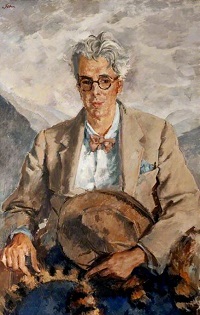
Portret door Augustus Edwin John, 1930
De Nederlandse schrijver Thomas Heerma van Voss werd geboren in Amsterdam op 13 juni 1990. Zie ook alle tags voor Thomas Heerma van Voss op dit blog.
Uit: Stern
“Weet ik, maar ik wil niet. Niet vandaag.’
De ballen waarmee Stern zojuist wierp komen teruggerold, klaar voor de volgende speler.
‘Hoezo niet vandaag? Voel je je weer niet lekker?’
‘Nee, dan zou ik dat wel zeggen. Ik heb gewoon niet zo’n zin.’
‘Maar lieverd, we gaan zowat elke week naar De Kegel. Dit is traditie.’ Stern doet zijn best begripvol te klinken, maar hoort verongelijktheid in zijn stem, verontwaardiging misschien wel.
‘Papa, alsjeblieft. Ik wil gewoon niet meer.’
De afgelopen maand waren er al genoeg aanwijzingen geweest voor dit moment, beseft Stern. De ene keer wilde Bram niet bowlen omdat hij zijn eindexamens moest voorbereiden, de andere keer omdat hij zich niet lekker voelde. Stern was telkens in zijn eentje gegaan. En als hij dan twee uur later thuiskwam, trof hij Bram achter zijn computer. Soms zat hij te chatten via Facebook, soms speelde hij een spelletje. Nooit enig teken van misselijkheid of zenuwen voor naderende tentamens. ‘Alles goed hier?’ vroeg Stern meestal, waarop Bram antwoordde: ‘Ach.’ Of: ‘Gaat wel.’
Hij kijkt naar de twee bowlingballen naast hem. Het is of ze smeken opnieuw gebruikt te worden. Stern kan de verleiding niet weerstaan, hij pakt de eerste en gooit hem op volle kracht vooruit.
Pats, zes kegels om.
Bram gaat zitten op het bankje naast de baan. Hij pakt zijn iPhone. Sinds hij die vorige zomer gekocht heeft, zijn Bram en zijn mobiel onafscheidelijk. Voortdurend haalt hij het compacte, zwarte apparaatje tevoorschijn en typt gehaast allerlei berichten. Af en toe krijgt Stern het idee dat zijn zoon meer via zijn smartphone zegt dan mondeling.”
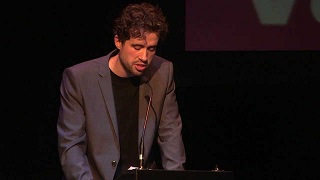
De Franse journaliste en schrijfster Tristane Banon werd geboren op 13 juni 1979 in Neuilly-sur-Seine. Zie ook alle tags voor Tristane Banon op dit blog.
Uit: “Erreurs avouées…”.
« Je le regarde droit dans les yeux:
– Si vous êtes si humain que ça, pourquoi avoir choisi la politique où la moindre erreur peut vous être fatale! Où tout n’est que mécanique de guerre?
Posément, il me répond.
– Les gens qui ont réussi leur vie professionnelle sont souvent considérés par les autres comme des machines. On pense que tout leur réussit alors que c’est faux. Et quand enfin ils commettent une bourde, on prend conscience que tout ne leur réussit pas forcément. Paradoxalement, ça rassure, ça humanise. Pour ma part, je n’aime pas cette idée qu’on puisse me prendre pour un automate, c’est vraiment désagréable!
Je glisse sur la remarque (me visait-elle?) et enchaîne:
– C’est maintenant au professeur que je m’adresse: qu’est-ce qu’une erreur?
Ton docte:
– Une erreur, c’est quelque chose qui n’est pas fait comme ça devrait l’être. Ce qui ne veut pas dire que ce soit mal. Si je tourne à droite au lieu de tourner à gauche, c’est une erreur; or cela n’a pourtant rien de critiquable en soi.
Je souris:
– Vous ne croyez pas que l’exemple est mal choisi?
Il acquiesce.
– Quoi qu’il en soit, cela n’a rien à voir avec une faute. Une faute, c’est quelque chose qui va à l’encontre d’un code personnel que l’on est tous supposés respecter, généralement un code moral.”

De Engelse schrijfster, dichteres en vertaalster Dorothy Leigh Sayers werd geboren op 13 juni 1893 in Oxford. Zie ook alle tags voor Dorothy L. Sayers op dit blog.
Uit: Are Women Human? Astute and Witty Essays on the Role of Women in Society
“A man once asked me … how I managed in my books to write such natural conversation between men when they were by themselves. Was I, by any chance, a member of a large, mixed family with a lot of male friends? I replied that, on the contrary, I was an only child and had practically never seen or spoken to any men of my own age till I was about twenty-five. “Well,” said the man, “I shouldn’t have expected a woman (meaning me) to have been able to make it so convincing.” I replied that I had coped with this difficult problem by making my men talk, as far as possible, like ordinary human beings. This aspect of the matter seemed to surprise the other speaker; he said no more, but took it away to chew it over. One of these days it may quite likely occur to him that women, as well as men, when left to themselves, talk very much like human beings also.”
(…)
“In reaction against the age-old slogan, “woman is the weaker vessel,” or the still more offensive, “woman is a divine creature,” we have, I think, allowed ourselves to drift into asserting that “a woman is as good as a man,” without always pausing to think what exactly we mean by that. What, I feel, we ought to mean is something so obvious that it is apt to escape attention altogether, viz: (…) that a woman is just as much an ordinary human being as a man, with the same individual preferences, and with just as much right to the tastes and preferences of an individual. What is repugnant to every human being is to be reckoned always as a member of a class and not as an individual person.”
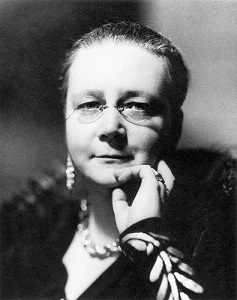
De Britse schrijver en presentator Marcel Theroux werd geboren op 13 juni 1968 in Kampala, Oeganda. Zie ook alle tags voor Marcel Theroux op dit blog.
Uit: Far North
“It’salmost worth more to me as firewood. Some winters I’ve looked at it longingly as I sat under a pile of blankets, teeth chattering in my head, snow piled up to the eaves, and thought to myself, Damn it, take a hatchet to it, Makepeace, and be warm again! But it’s a point of pride with me that I never have. Where will I get another pianola from? And just because I can’t tune the thing and don’t know anybody who can, that doesn’t mean that person doesn’t exist, or won’t be born one day. Our generation’s not big on reading or tuning pianolas. But our parents and their parents had plenty to be proud of. Just look at that thing if you don’t believe me: the burl on the maple veneer, and the workmanship on her brass pedals. The man who made that cared about what he was doing. He made that pianola with love. It’s not for me to burn it.
The books all belonged to my folks. Charlo and my ma were the big readers. Except for that bottom shelf. I brought those back here myself.
Usually when I come across books I take them to an old armory on Delancey. It’s empty now, but there’s so much steel in the outer door, you’d need a keg of gunpowder to get to them without the key. As I said, I don’t read them myself, but it’s important to put them aside for someone who will. Maybe it’s written in one of them how to tune a pianola.
I found them like this: I was going down Mercer Street one morning. It was deep winter. Snow every where, but no wind, and the breath from the mare’s nostrils rising up like steam from a kettle. On a windless day, the snow damps the sound, and the silence every where is eerie. Just that crunch of hooves, and those little sighs of breath from the animal.
All of a sudden, there’s a crash, and a big armful of books flops into the snow from what must have been the last unbroken window on the entire street until that moment. The horse reared up at the sound. When I had her calm again, I looked up at the window, and what do you know, there’s a little figure hang-dropping into the books.”
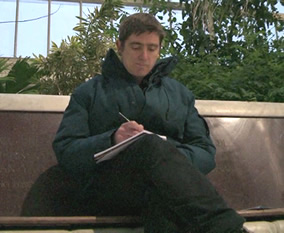
Zie voor nog meer schrijvers van de 13e juni ook mijn vorige blog van vandaag.

1 thoughts on “Fernando Pessoa , Willem Brakman, William Butler Yeats, Thomas Heerma van Voss, Tristane Banon, Dorothy L. Sayers, Marcel Theroux”
De commentaren zijn gesloten